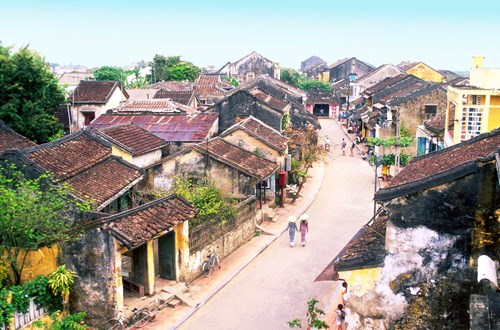
The APEC Economic Leaders’ Week, which will take place in the Central Da Nang city on November 6-11, will offers opportunities to promote the beauty of Vietnam’s landscapes and people, especially destinations in the Central region, to international friends.
A wide range of tourism
programs have been developed to serve tourists during the Week such as tours
connecting local renowned destinations, including Ngu Hanh Son Mountain, Museum
of Cham Sculpture, Son Tra peninsula, the ancient Hoi An city and Hue citadel,
Than Tai Mountain, and night boat tours on the Han River.

A corner of Hoi An ancient town. Photo: vietnam-guide.com
Besides, the municipal Department of Tourism prepared about 13,000
rooms at seaside resorts and hotels to serve the Week, while providing staff
and chefs of hotels and restaurants with professional training.
Head of the Vietnam
National Tourism Administration Nguyen Van Tuan said the APEC event is a
"golden chance” to promote Vietnam as an open and friendly country.
A research of Assoc.
Prof., Dr. Pham Trung Luong from the Vietnam Environment and Sustainable
Development Institute showed that APEC economies have become attractive and
friendly destinations for tourists in recent years. In 2015, the region served
396 million visitors, or 33 percent of total holidaymakers of the world,
generating revenue exceeding USD 598 billion and accounting for 44.5 percent of
the world’s tourism revenue.
The World Tourism
Organization of the United Nations forecast that the Asia-Pacific region will
receive 27 percent of the world’s tourists by 2020.
The APEC Economic
Leaders’ Week is expected to bring together heads of state and some 10,000
delegates from 21 APEC member economies.
Established in 1989, APEC
comprises 21 economies, namely Australia; Brunei; Canada; Chile; China; Hong
Kong (China); Indonesia; Japan; the Republic of Korea; Malaysia; Mexico; New
Zealand; Papua New Guinea; Peru; the Philippines; Russia; Singapore; Chinese
Taipei; Thailand; the United States; and Vietnam.
Vietnam joined APEC in
1998, and hosted APEC in 2006.
Source: PANO
Spanning thousands of hectares and winding gracefully along mountain slopes, hillsides, and riverbanks, the terraced rice fields of Lac Son District present a stunning and captivating beauty. This region, renowned for its remarkable terraced landscapes, is also the centre of Hoa Binh Culture known for numerous archaeological sites.
The life of Mong people in Hang Kia and Pa Co communes of Mai Chau district has improved much thanks to tourism development.
The man-made Hoa Binh Lake, with a water surface area of approximately 9,000 hectares and a capacity of 9.45 billion cubic meters, stretches over 200 kilometers from Hoa Binh to Son La provinces. With the goal of developing into a national tourism area, the Hoa Binh Lake tourism area is expected to not only become the largest tourism centre in the province but also one of the 12 key tourist destinations in the northern midland and mountainous region of Vietnam.
Da Bia hamlet, now Duc Phong, in Tien Phong commune, Da Bac district, was once almost isolated from the outside as the only way to the hamlet was to get a boat ride across the Hoa Binh reservoir. However, as its tourism potential has been unleashed, the hamlet has established itself as one of the most attractive destinations on the tourism map. It has even received the ASEAN Community-Based Tourism Awards in 2019.
In the first 9 months of 2024, Mai Chau district, Hoa Binh province welcomed over 684 thousand visitors to visit and relax. In which, over 516 thousand domestic visitors and more than 168 thousand international visitors. Total revenue from tourism is estimated at over 821 billion VND.
Da Bac district, bestowed with stunning landscapes, is developing ecological and resort tourism offerings. Several tourist sites, put into operation this year, has attracted throngs of high-spending and young domestic visitors.



